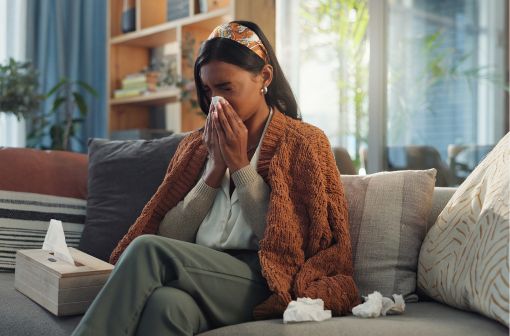“The better your health is, at the end of the day, the better your quality of life. And your future self is going to thank you down the track for what you do now.”—Alexandra Warhurst, Health Coach, Remedy Healthcare
Key points
- Our bodies and health needs change as we age. Being informed and prepared are two of the best ways to stay healthy in our 40s.
- Developing a good relationship with a GP you trust will help you to keep on top of your health over the long term.
- It can be difficult to find the time and energy for self-care in your 40s, but making small lifestyle changes and prioritising your health can make a big difference to your future wellbeing.
“Your 40s are a time when you can really set yourself up for a long and enjoyable life,” says Dr Fiona Jane, Specialist Women’s Health GP at Jean Hailes for Women’s Health.
But there are also a few things to look out for in this decade. Here are our experts’ top tips for staying healthy and preventing illness in your 40s and beyond into your 50s and 60s.
.png)
Find a GP you trust
One of the very best things you can do for your health long term is to develop a good relationship with your GP.
“The first thing I tell the women I work with is: you need to have a good relationship with a health practitioner you trust,” says Fiona. “Someone you can have conversations about preventative care, such as bone and heart health, breast awareness, and sexual, bowel and bladder health. All the things that sometimes you’re not comfortable discussing, but that are really important, and that change with hormonal change and aging.”
It also gives your GP a chance to get to know your individual circumstances and medical history, which can help them catch things early or even prevent issues before they arise.
“You're not going to click with every health professional and that’s okay,” reassures Alexandra Warhurst, an Accredited Practising Dietitian and a Health Coach for HealthierMe™, a program run by Australian Unity’s partner Remedy Healthcare. “It's fine to shop around for someone that you feel comfortable with and who listens to you.”
Take the reins
Did you know that we lose muscle and bone density as we age, but that we can slow or reverse this decline through regular strength training? It’s just one example of how proactive changes can make a real difference to your health.
Fiona believes it’s extremely important for women to be well-educated about the changes that happen to their bodies as they age. “Once they have that information, they can make good choices about what they want for their current and future health.”
In fact, “roughly 30 percent of Australia's burden of disease can be attributed to modifiable risk factors,” says Alexandra. “And healthy lifestyle factors can help prevent some of these chronic diseases from occurring down the track.”
Fiona suggests setting SMART (specific, measurable, achievable, relevant and time-bound) goals with your GP, who can help you tailor them to your individual needs. For example, “we might focus on areas of our life like our nutrition or our exercise, our alcohol intake, whether we smoke, our mental health, and even things like being SunSmart,” says Alexandra.
Just don’t try to do too much at once, she warns. “Pick one thing and make it a habit, build it into your routine, and then you can add other things on.”

Address the hormonal curveball
Your 40s can be a very demanding decade, with any combination of kids, aging parents, social commitments and work using up a whole lot of energy. And then, on top of all this, there’s perimenopause.
“It starts on average around 45,” says Fiona, “and it can be associated with symptoms such as hot flushes, night sweats, sleep disturbances, joint aches and pains, and mood changes, which may go on for up to 10 years.”
Around “80 percent of women experience symptoms, and up to 20 percent of those experience severe symptoms”, she adds, and the flow-on effects can impact every area of their wellbeing. However, the symptoms are treatable, so don’t feel like you have to suffer—discuss your experience with your GP to find out more about your options.
Simple tips for better health in your 40s (and beyond)
To stay on top of your health in your 40s, our experts recommend the following steps:
- Schedule a yearly check-up with your GP. “Some of the tests specifically for your 40s include assessing your risk of heart disease, and checking your blood pressure, your eyes, your blood glucose levels, and your cholesterol,” says Alexandra. “There are also cervical screening tests, breast and skin cancer checks, and dental check-ups.”
- Make a plan with your doctor. Discuss the necessity and frequency of future screening tests and check-ups.
- Ask a lot of questions and get information from reliable, evidence-based sources. This could mean government websites such as the Better Health Channel, or those recommended by your GP.
- Talk to your friends. “They are probably going through the same things,” says Fiona.
- Monitor your mental health and mood. Make your wellbeing a daily priority and do the things that help you relax.
With so much going on, “sometimes our own health just falls to the bottom of the list,” says Alexandra. “But the better your health is, at the end of the day, the better your quality of life. And your future self is going to thank you down the track for what you do now.”
Disclaimer:
Information provided in this article is not medical advice and you should consult with your healthcare practitioner. Australian Unity accepts no responsibility for the accuracy of any of the opinions, advice, representations or information contained in this publication. Readers should rely on their own advice and enquiries in making decisions affecting their own health, wellbeing or interest.
* Singles cover with Base Tier rebate and 4% direct debit discount


